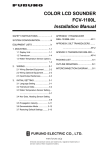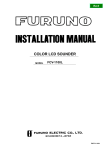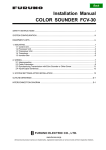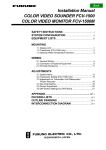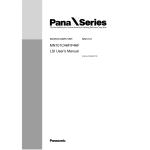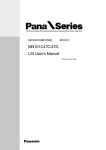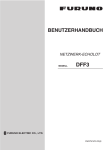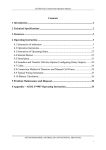Download Furuno ETR-30N Network Card User Manual
Transcript
Back NETWORK SOUNDER ETR-30N SAFETY INSTRUCTIONS WARNING WARNING ELECTRICAL SHOCK HAZARD Install the transducer tank according to the installation instructions. Do not open the equipment unless totally familiar with electrical circuits and service manual. Failure to install the tank correctly may result in water leakage and damage to the ship's hull. Only qualified personnel should work inside the equipment. Turn off the power at the switchboard before beginning the installation. Fire or electrical shock can result if the power is left on. Do not install the equipment where it may get wet from rain or water splash. Water in the equipment can result in fire, electrical shock or damage to the equipment. Be sure no water leaks in at the transducer mounting location. Water leakage can sink the vessel. Also, confirm that the transducer will not loosen by ship's vibration. The installer of the equipment is solely responsible for the proper installation of the equipment. FURUNO will assume no responsibility for any damage associated with improper installation. Be sure that the power supply is compatible with the voltage rating of the equipment. Connection of an incorrect power supply can cause fire or damage the equipment. Do not diassemble or modify the equipment. Electrical shock, damage to the equipment or injury may result. i CAUTION CAUTION Ground the equipment to prevent mutual interference. The transducer cable must be handled carefully, following the guidelines below. • Keep fuels and oils away from the cable. • Locate the cable where it will not be damaged. • The cable sheath is made of chlorophrene or polychloride vinyl, which is easily damaged by plastic solvents such as toulene. Locate the cable well away from plastic solvents. Observe the following compass safe distances to prevent interference to a magnetic compass: Standard compass ETR-30N 1.7 m Steering compass 1.1 m Do not allow warm water or any liquid other than seawater or freshwater to contact the transducer. Use the correct fuse. Use of a wrong fuse can cause serious damage to the equipment. Damage to the transducer may result. Be sure to enter transducer model correctly. Do not install the transducer where noise or air bubbles is present. Incorrect setting may damage the transducer. Performance will be affected. Do not enter transducer type manually if the transducer type is programmed into the equipment. Damage to the transducer may result. WARNING LABEL A warning label is attached to the equipment. Do not remove the label. If the label is missing or illegible, contact a FURUNO agent or dealer about replacement. WARNING To avoid electrical shock, do not remove cover. No user-serviceable parts inside. ii Name: Warning Label (1) Type: 86-003-1011-1 Code No.: 100-236-231 TABLE OF CONTENTS SYSTEM CONFIGURATION................................................................................ iv EQUIPMENT LISTS ............................................................................................. vi 1. MOUNTING ...................................................................................................... 1 1.1 Network Sounder............................................................................................................. 1 1.2 Transducer...................................................................................................................... 2 2. WIRING, SETUP ............................................................................................... 3 2.1 Wiring.............................................................................................................................. 3 2.2 Settings for Single Network Sounder............................................................................... 6 2.3 Settings for Two Network Sounders............................................................................... 12 2.4 Erasing Transducer Setting ........................................................................................... 15 3. OPERATION, MAINTENANCE ...................................................................... 16 3.1 Controls......................................................................................................................... 16 3.2 Additions to NavNet Series Operator’s Manual.............................................................. 17 3.3 Replacing Fuses ........................................................................................................... 18 3.4 All Clear......................................................................................................................... 19 APPENDIX NEW BLT TRANSDUCERS ........................................................ AP-1 SPECIFICATIONS........................................................................................... SP-1 PACKING LIST ................................................................................................. A-1 OUTLINE DRAWINGS ...................................................................................... D-1 INTERCONNECTION DIAGRAM ......................................................................S-1 iii SYSTEM CONFIGURATION Single network sounder NavNet Series NavNet Radar Display Unit Network Sounder ETR-30N NavNet Series HUB* NavNet Radar Display Unit NavNet Display Unit Rectifier PR-62 NavNet Display Unit Ship’s Mains 12-24 VDC NavNet Display Unit 100/110/115/220/230 VAC, 1φ, 50/60 Hz Transducer High Freq. Low Freq. Transducer : Standard : Option : Local Supply * = By using a hub, one NavNet series radar and three NavNet display units may be connected. System configuration, single network sounder iv Multiple network sounders NavNet Series HUB*1 Network Sounder ETR-30N NavNet Radar Display Unit NavNet Display Unit NavNet Display Unit *3 Network Sounder ETR-6/10N*2 : Standard : Optional Supply : Local Supply *1 = By using a hub, one NavNet series radar and two NavNet display units may be connected. *2 = Maximum two network sounders may be installed. *3 = Connect to NET KP. System configuration, two ETR-30N NavNet Series HUB* Network Sounder ETR-30N NavNet Radar Display Unit NavNet Display Unit NavNet Display Unit Network Sounder ETR-6/10N : Standard : Optional Supply : Local Supply * = By using a hub, one NavNet series radar and two NavNet display units may be connected. System configuration, ETR-30N + ETR-6/10N v EQUIPMENT LISTS Standard supply Name Network Sounder Spare Parts* Installation Materials* Type ETR-30N SP02-04601 CP02-07100 (w/NavNet connection cable) Code No. — Qty 002-180-150 — 1 set Remarks 1 1 set CP02-07110 — (No NavNet connection cable) * = See packing list at end of manual. • Power Cable MJ-A3SPF0013-035 • NavNet connection cable MJ-A6SPF0014-050 (5 m) • CP02-07101 • Power Cable MJ-A3SPF0013-035 • CP02-07101 Optional supply Name Type Code No. Remarks Piggyback Mount Kit OP02-84 002-186-170 For mounting two network sounders piggyback style Cable Assy. MJ-A6SPF0014-010 000-144-421 6P-6P, 1 m, For NavNet MJ-A6SPF0014-050 000-144-422 6P-6P, 5 m, For NavNet MJ-A6SPF0014-100 000-144-423 6P-6P, 10 m, For NavNet MJ-A6SPF0014-200 000-144-424 6P-6P, 20 m, For NavNet MJ-A6SPF0014-300 000-144-425 6P-6P, 30 m, For NavNet MJ-A6SRMD/TM11AP8-005 000-144-463 For HUB NCS255AD-254P-L500 000-142-518 For connection of combination transducers MJ-A7SPF0002-050 000-127-656 For connecting ETRs PR-62 000-013-484 100 VAC 000-013-485 110 VAC 000-013-486 220 VAC 000-013-487 230 VAC Rectifier Transducer See the next several pages for transducer and recommended thru-hull pipe and tank. vi Available transducers 1kW transducer Freq. (kHz) Ship Steel FRP 28/50 Steel FRP Steel FRP 28/68 Steel FRP Steel 28/88 FRP 28/200 Steel FRP Steel FRP 50/88 Steel FRP Steel FRP Transducer Thru-hull pipe Tank — — — — TWB-6000 (2) (000-015-207) T-656 (000-015-982) — — 28F-8 (000-015-003) 50F-8G (000-015-066) — — — — 28F-8 (000-015-003) 68F-8H (000-015-067) — — — — TWB-6000 (2) (000-015-207) T-657 (000-015-983) — — — — — — — — — — TWB-6000 (2) (000-015-207) T-658 (000-015-984) — — — — — — 28F-8 (000-015-003) 50B-6 (000-015-042) 50B-6B (000-015-043, 15M) (000-015-018, 30M) (000-015-255, 40M) 28F-8 (000-015-003) 50B-9 (000-138-574) 50B-9B (000-015-065) 28F-8 (000-015-003) 88B-8 (000-015-024) 28F-8 (000-015-003) 200B-5S (000-015-029) 50B-6 (000-015-042) 50B-6B (000-015-043, 15M) (000-015-018, 30M) (000-015-255, 40M) 88B-8 (000-015-024) 50B-9 (000-138-574) 50B-9B (000-015-065) 88B-8 (000-015-024) 50F-8G (000-015-066) 88B-8 (000-015-024) vii 1kW transducer (con’t) Freq. (kHz) Ship Steel FRP Steel FRP 50/200 Steel FRP Steel Transducer Thru-hull pipe Tank — — — — — — — — — — — — — — — — — — — — 68F-8H (000-015-067) 200B-5S (000-015-029) — — — — 88B-8 (000-015-024) 200B-5S (000-015-029) — — — — 50B-6 (000-015-042) 50B-6B (000-015-043, 15M) (000-015-018, 30M) (000-015-255, 40M) 200B-5S (000-015-029) 50B-9 (000-138-574) 50B-9B (000-015-065) 200B-5S (000-015-029) 50F-8G (000-015-066) 200B-5S (000-015-029) 50/200-1T (000-015-170) FRP Steel 50/200-1ST (000-015-110) FRP Steel 68/200 FRP 88/200 Steel FRP viii 2kW transducer Freq. (kHz) Ship Steel 28/50 FRP Steel 28/68 FRP Steel 28/88 FRP Steel 28/200 FRP Transducer Thru-hull pipe TFB-7000 (2) (000-015-209) 28F-18 (000-015-004, 15M) (000-138-573, 30M) 50B-12 (000-015-020) 28F-18 (000-015-004, 15M) (000-138-573, 30M) 68F-30H (000-015-073) 28F-18 (000-015-004, 15M) (000-138-573, 30M) 88B-10 (000-015-025) 28F-18 (000-015-004, 15M) (000-138-573, 30M) 200B-8 (000-015-030) 200B-8B (000-015-032) 200B-8N (000-015-045) Steel 50B-12 (000-015-020) 88B-10 (000-015-025) 50/88 FRP Steel FRP 50B-12 (000-015-020) 200B-8 (000-015-030) 200B-8B (000-015-032) 200B-8N (000-015-045) Steel 50BL-12 (000-015-246) 200B-8B (000-015-032) FRP Steel 68/200 FRP Steel 88/200 FRP 68F-30H (000-015-073) 200B-8 (000-015-030) 200B-8B (000-015-032) 200B-8N (000-015-045) 88B-10 (000-015-025) 200B-8 (000-015-030) 200B-8B (000-015-032) 200B-8N (000-015-045) ix T-634 (000-015-810) — — — — TRB-1100 (2) (000-015-218) T-634-F (000-015-811) TFB-7000 (2) (000-015-209) T-636 (000-015-813) TRB-1100 (2) (000-015-218) T-636-F (000-015-814) TFB-7000 (2) (000-015-209) T-638 (000-015-818) TRB-1100 (2) (000-015-218) T-638-F (000-015-819) TFB-7000 (2) (000-015-209) T-643 (000-015-821) TRB-1100 (2) (000-015-218) T-643-F (000-015-822) TFB-7000 (2) (000-015-209) T-645 (000-015-826) — 50/200 Tank — TWB-6000 (2) (000-015-207) T-693 (000-015-044) TRB-1100 (2) (000-015-218) T-693-F (000-015-241) TFB-7000 (2) (000-015-209) T-647 (000-015-831) TRB-1100 (2) (000-015-218) T-647-F (000-015-832) TFB-7000 (2) (000-015-209) T-649 (000-015-833) TRB-1100 (2) (000-015-218) T-649-F (000-015-834) 3kW transducer Freq. (kHz) 28/45 Ship Steel FRP Transducer 28F-24H (000-015-075) 45F-12H (000-015-076) — — TRB-1100 (2) (000-015-218) T-681-F (000-015-850) Steel TWB-6000 (2) (000-015-207) T-696 (000-015-048) TRB-1100 (2) (000-015-218) T-696-F (000-015-244) 28F-24H (000-015-075) 50BL-24H (000-015-247) FRP Steel FRP 28F-24H (000-015-075) 68F-30H (000-015-073) — — — — TFB-7000 (2) (000-015-209) T-682 (000-015-851) TRB-1100 (2) (000-015-218) T-682-F (000-015-852) TFB-7000 (2) (000-015-209) T-683 (000-015-853) FRP TRB-1100 (2) (000-015-218) T-683-F (000-015-854) Steel TFB-7000 (2) (000-015-209) T-683 (000-015-853) TRB-1100 (2) (000-015-218) T-683-F (000-015-854) Steel 28/88 FRP Steel 28/150 28/200 28F-24H (000-015-075) 88F-126H (000-015-068) 28F-24H (000-015-075) 150B-12H (000-015-074) 28F-24H (000-015-075) 200B-12H (000-015-069) FRP Steel FRP Steel FRP 45/200 — FRP 28/50 45/150 — T-681 (000-015-849) 28F-24H (000-015-075) 50F-24H (000-138-582) 45/88 Tank TFB-7000 (2) (000-015-209) Steel 28/68 Thru-hull pipe Steel FRP 45F-12H (000-015-076) 88F-126H (000-015-068) 45F-12H (000-015-076) 150B-12H (000-015-074) 45F-12H (000-015-076) 200B-12H (000-015-069) — — — — — — — — — — — — TFB-7000 (2) (000-015-209) T-682 (000-015-851) FRP TRB-1100 (2) (000-015-218) T-682-F (000-015-852) Steel TWB-6000 (2) (000-015-207) T-697 (000-015-239) TRB-1100 (2) (000-015-218) T-697-F (000-015-245) Steel 50F-24H (000-138-582) 88F-126H (000-015-068) 50/88 50BL-24H (000-015-247) 88F-126H (000-015-068) FRP x 3kW transducer (con’t) Freq. (kHz) Ship Transducer Tank TFB-7000 (2) (000-015-209) TRB-1100 (2) (000-015-218) T-683 (000-015-853) T-683-F (000-015-854) TFB-7000 (2) (000-015-209) T-683 (000-015-853) FRP TRB-1100 (2) (000-015-218) T-683-F (000-015-854) Steel TWB-6000 (2) (000-015-207) T-695 (000-015-047) FRP TRB-1100 (2) (000-015-218) T-695-F (000-015-243) Steel TFB-7000 (2) (000-015-209) T-646 (000-015-829) TRB-1100 (2) (000-015-218) T-646-F (000-015-830) TFB-7000 (2) (000-015-209) T-646 (000-015-829) TRB-1100 (2) (000-015-218) T-646-F (000-015-830) Steel 50/150 FRP Steel 50F-24H (000-138-582) 150B-12H (000-015-074) 50F-24H (000-138-582) 200B-12H (000-015-069) 50/200 68/150 FRP 50BL-24H (000-015-247) 200B-12H (000-015-069) 68F-30H (000-015-073) 150B-12H (000-015-074) Steel 68F-30H (000-015-073) 200B-12H (000-015-069) 68/200 FRP 88/150 Thru-hull pipe Steel FRP 88F-126H (000-015-068) 150B-12H (000-015-074) Steel 88F-126H (000-015-068) 200B-12H (000-015-069) 88/200 FRP — — — — TFB-7000 (2) (000-015-209) T-685 (000-015-855) TRB-1100 (2) (000-015-218) T-685-F (000-015-856) xi 1kW/2kW transducer Output (W) Freq. (kHz) 28/50 Ship Steel FRP 28/68 Steel FRP 28/88 Steel FRP Steel 28/200 FRP 45/88 Steel FRP Steel 45/200 FRP Steel 1 k/2 k FRP 50/88 Steel FRP Transducer Thru-hull pipe Tank 28F-8 (000-015-003) 50B-12 (000-015-020) — — — — 28F-8 (000-015-003) 68F-30H (000-015-073) — — — — 28F-8 (000-015-003) 88B-10 (000-015-025) — — — — 28F-8 (000-015-003) 200B-8 (000-015-030) 200B-8B (000-015-032) 200B-8N (000-015-045) — 45F-3H 88B-10 (000-015-025) — — — — 45F-3H 200B-8 (000-015-030) 200B-8B (000-015-032) 200B-8N (000-015-045) 50B-6 (000-015-042) 50B-6B (000-015-043, 15M) (000-015-018, 30M) (000-015-255, 40M) 88B-10 (000-015-025) 50B-9 (000-138-574) 50B-9B (000-015-065) 88B-10 (000-015-025) — — — — — — — — — — — — 50F-8G (000-015-066) 88B-10 (000-015-025) FRP Steel FRP 50/200 Steel FRP T-657 (000-015-983) — Steel 50/88 TWB-6000 (2) (000-015-207) 50B-6 (000-015-042) 50B-6B (000-015-043, 15M) (000-015-018, 30M) (000-015-255, 40M) 200B-8 (000-015-030) 200B-8B (000-015-032) 200B-8N (000-015-045) 50B-9 (000-138-574) 50B-9B (000-015-065) 200B-8 (000-015-030) 200B-8B (000-015-032) 200B-8N (000-015-045) xii TFB-7000 (2) (000-015-209) T-636 (000-015-813) TRB-1100 (2) (000-015-218) T-636-F (000-015-814) — — — — TWB-6000 (2) (000-015-207) — T-658 (000-015-984) — 1kW/2kW transducer (con’t) Output (W) Freq. (kHz) Ship Steel 50/200 FRP Steel 68/200 FRP Steel 88/200 FRP Transducer 50F-8G (000-015-066) 200B-8 (000-015-030) 200B-8B (000-015-032) 200B-8N (000-015-045) 68F-8H (000-015-067) 200B-8 (000-015-030) 200B-8B (000-015-032) 200B-8N (000-015-045) 88B-8 (000-015-024) 200B-8 (000-015-030) 200B-8B (000-015-032) 200B-8N (000-015-045) Thru-hull pipe Tank TFB-7000 (2) (000-015-209) T-638 (000-015-818) TRB-1100 (2) (000-015-218) T-638-F (000-015-819) — — — — TWB-6000 (2) (000-015-207) T-659 (000-015-985) — — Thru-hull pipe Tank 28F-8 (000-015-003) 45F-12H (000-015-076) — — — — 28F-8 (000-015-003) 50F-24H (000-138-582) — — — — 28F-8 (000-015-003) 68F-30H (000-015-073) — — — — 28F-8 (000-015-003) 88F-126H (000-015-068) — — — — 28F-8 (000-015-003) 100B-10R (000-027-438) — — — — 28F-8 (000-015-003) 150B-12H (000-015-074) — — — — 28F-8 (000-015-003) 200B-12H (000-015-069) — — — — — — — — — — — — 1kW/3kW transducer Output (W) Freq. (kHz) 28/45 Ship Steel FRP 28/50 Steel FRP 28/68 Steel FRP 28/88 Steel FRP 28/107 Steel FRP 1 k/3 k 28/150 Steel FRP 28/200 Steel FRP Steel 50/88 FRP Steel FRP Transducer 50B-6 (000-015-042) 50B-6B (000-015-043, 15M) (000-015-018, 30M) (000-015-255, 40M) 88F-126H (000-015-068) 50B-9B (000-015-065) 88F-126H (000-015-068) xiii 1kW/3kW transducer (con’t) Output (W) Freq. (kHz) 50/88 Ship Steel FRP Steel FRP 50/150 Steel FRP Steel FRP Steel 50/200 FRP Steel 1 k/3 k FRP 50/200 Steel FRP 68/107 Steel FRP 68/150 Steel FRP 68/200 Steel FRP 88/150 Steel FRP 50/200 Steel FRP 68/150 Steel FRP Transducer Thru-hull pipe Tank 50F-8G (000-015-066) 88F-126H (000-015-068) — — — — 50B-6 (000-015-042) 50B-6B (000-015-043, 15M) (000-015-018, 30M) (000-015-255, 40M) 150B-12H (000-015-074) — — — — 50B-9 (000-138-574) 50B-9B (000-015-065) 150B-12H (000-015-074) — — — — 50F-8G (000-015-066) 150B-12H (000-015-074) — — — — — — — — 50B-9 (000-138-574) 50B-9B (000-015-065) 200B-12H (000-015-069) — — — — 50F-8G (000-015-066) 200B-12H (000-015-069) — — — — 68F-8H (000-015-067) 100B-10R (000-027-438) — — — — 68F-8H (000-015-067) 150B-12H (000-015-074) — — — — 68F-8H (000-015-067) 200B-12H (000-015-069) — — — — 88B-8 (000-015-024) 150B-12H (000-015-074) — — — — 50F-8G (000-015-066) 200B-12H (000-015-069) — — — — 68F-8H (000-015-067) 150B-12H (000-015-074) — — — — 50B-6 (000-015-042) 50B-6B (000-015-043, 15M) (000-015-018, 30M) (000-015-255, 40M) 200B-12H (000-015-069) xiv 1kW/3kW transducer (con’t) Output (W) Freq. (kHz) 68/200 Ship Steel FRP 1 k/3 k 88/150 Steel FRP 88/200 Steel FRP Transducer Thru-hull pipe Tank 68F-8H (000-015-067) 200B-12H (000-015-069) — — — — 88B-8 (000-015-024) 150B-12H (000-015-074) — — — — 88B-8 (000-015-024) 200B-12H (000-015-069) — — — — xv 2kW/3kW transducer Output (W) Freq. (kHz) Ship Transducer Thru-hull pipe Tank Steel 28F-18 (000-015-004, 15M) (000-138-573, 30M) 45F-12H (000-015-076) — — — — 28F-18 (000-015-004, 15M) (000-138-573, 30M) 50F-24H (000-015-077) — — — — 28F-18 (000-015-004, 15M) (000-138-573, 30M) 68F-30H (000-015-073) — — — — 28F-18 (000-015-004, 15M) (000-138-573, 30M) 88F-126H (000-015-068) — — — — TFB-7000 (2) (000-015-209) T-637 (000-015-816) TRB-1100 (2) (000-015-218) T-637-F (000-015-817) 28F-18 (000-015-004, 15M) (000-138-573, 30M) 200B-12H (000-015-069) — — — — 50B-12 (000-015-020) 88F-126H (000-015-068) — — — — TFB-7000 (2) (000-015-209) T-644 (000-015-824) TRB-1100 (2) (000-015-218) T-644-F (000-015-825) 50B-12 (000-015-020) 200B-12H (000-015-069) — — — — 68F-30H (000-015-073) 150B-12H (000-015-074) — — — — 68F-30H (000-015-073) 200B-12H (000-015-069) — — — — 88B-10 (000-015-025) 150B-12H (000-015-074) — — — — 88B-10 (000-015-025) 200B-12H (000-015-069) — — — — 28/45 FRP Steel 28/50 FRP Steel 28/68 FRP Steel 28/88 FRP Steel 28/150 FRP Steel 28/200 FRP 2k/3k 50/88 Steel FRP Steel 50/150 FRP 50/200 Steel FRP 68/150 Steel FRP 68/200 Steel FRP 88/150 Steel FRP 88/200 Steel FRP 28F-18 (000-015-004, 15M) (000-138-573, 30M) 150B-12H (000-015-074) 50B-12 (000-015-020) 150B-12H (000-015-074) xvi 3kW/2kW transducer (con’t) Output (W) Freq. (kHz) 28/50 Ship Steel FRP 28/68 Steel FRP 28/88 Steel FRP Steel 28/200 FRP 45/88 Steel FRP Steel 3k/2k 45/200 FRP 50/88 Steel FRP Steel 50/200 FRP Steel 68/200 FRP Steel 88/200 FRP Transducer Thru-hull pipe Tank 28F-24H (000-015-075) 50B-12 (000-015-020) — — — — 28F-24H (000-015-075) 68F-30H (000-015-073) — — — — 28F-24H (000-015-075) 88B-10 (000-015-025) — — — — — — — — — — — — — — — — — — — — — — — — 28F-24H (000-015-075) 200B-8 (000-015-030) 200B-8B (000-015-032) 200B-8N (000-015-045) 45F-12H (000-015-076) 88B-10 (000-015-025) 45F-12H (000-015-076) 200B-8 (000-015-030) 200B-8B (000-015-032) 200B-8N (000-015-045) 50F-24H (000-015-077) 88B-10 (000-015-025) 50F-24H (000-015-077) 200B-8 (000-015-030) 200B-8B (000-015-032) 200B-8N (000-015-045) 68F-30H (000-015-073) 200B-8 (000-015-030) 200B-8B (000-015-032) 200B-8N (000-015-045) 88F-126H (000-015-068) 200B-8 (000-015-030) 200B-8B (000-015-032) 200B-8N (000-015-045) xvii TFB-7000 (2) (000-015-209) TRB-1100 (2) (000-015-218) T-647 (000-015-831) T-647-F (000-015-832) — — — — 1. MOUNTING 1.1 Network Sounder 1.1.1 Mounting considerations The network sounder can be installed on the deck or on the bulkhead. When selecting a mounting location, keep the following points in mind: • The temperature and humidity of the mounting location should be moderate and stable. • Locate the unit away from exhaust pipes and vents. • The mounting location should be well ventilated. • Do not install the equipment where it may get wet from rain or water splash. • Mount the unit where shock and vibration are minimal. • Keep the unit away from electromagnetic field-generating equipment such as motors and generators. • Leave slack in cables for maintenance and servicing ease. • For mounting on a bulkhead, be sure the mounting location is strong enough to support the weight of the unit (5.6 kg, 12.3 lbs) under the continued vibration normally experienced onboard the vessel. • Observe the following compass safe distances to prevent disturbance to a magnetic compass: standard compass, 1.7 m, steering compass, 1.1 m. 1.1.2 Mounting procedure Fix the network sounder to the mounting location with four tapping screws (5 × 25, supplied). 404 ±1 200 ±0.5 200 ±0.5 Mounting dimensions for the network sounder 1 1.1.3 Stacking units You may stack two network sounders by using the optional piggyback mount kit (Type OP02-84, Code No. 002-186-170) as below. Note: Change the tap setting on the lower unit before installing the upper unit. See paragraph 2.2 for how to change tap setting. Contents of piggyback mount kit Name Type Code No. Qty Jointing Fixture (LWR) 02-142-1131 100-300-211 1 Jointing Fixture (UPR) 02-142-1132 100-300-221 1 Hexagon Head Bolt B M5 x 12 000-803-147 2 Pan Head Screw B M4 x 8 000-881-445 15 # # # # # FURUNO NETWORK SOUNDER ETR-30N # HOST NAME 4 5 6 3 7 2 8 1 0 9 DEFAULT Remarks Remove mounting feet. # TX/STBY POWER I ON Jointing Fixture (UPR) O OFF # Pan Head Screw B SIDE VIEW Jointing Fixture (LWR) Hexagon Head Bolt B # # # # # # # FURUNO NETWORK SOUNDER ETR-30N HOST NAME 4 5 6 3 7 2 8 1 0 9 DEFAULT TX/STBY POWER I ON O OFF # = Screw location (15) How to assemble the piggyback mount kit 1.2 Transducer The performance of this sounder is directly related to the mounting location of the transducer. When selecting a mounting location keep in mind the following points: • Select a location not influenced by air bubbles and engine noise. • As a general rule the position between 1/3 and 1/2 of ship’s length from the bow is usually a good location. • The face of the transducer must be facing the sea bottom under normal cruising conditions. 2 2. WIRING, SETUP 2.1 Wiring 2.1.1 Standard installation Connect NavNet series display unit or HUB, transducer, power cable and ground wire as below. NavNet Series display unit or HUB Ground Wire KIV 2.0SQ, black, 2 m MJ-A6SPF0014-050, 5 m TRANSDUCER L NETWORK H NET KP OUT/IN OUT/IN 12-24VDC +1 NETWORK SOUNDER 3 GND 2 - Ground Ground Terminal MJ-A3SPF0013-035, 3.5m Black (-) White (+) Shield Battery Low Freq. High Freq. Transducer Transducer Connection of network sounder 3 Transducer Route the transducer cable well away from power cables, televisions and CRTs to prevent interference to the network sounder. Attach the NCS connector to the transducer cable as below and connect it to the appropriate TRANSDUCER connector on the front of the network sounder. Shield Shield Foam 71TS-10-1 Cable NCS Connector Cable Clamp NCS-254-P How to attach connector to transducer cable Note: For dual-frequency transducer, use the optional cable assy. NCS255AD-254P-L500. Ground To prevent interference to the picture and radio equipment, connect a ground wire (KIV 2.0 sq, black) between the ground terminal and ship’s grounding bus. The length of the wire should be as short as possible. To obtain a good ground on an FRP vessel, a 20 × 30 cm copper plate can be welded on the outside of the ship’s hull. Connect the ground wire to the copper plate. Note: Use a "closed-type" lug ( not use an "open-type" lug ( ) to make the connection at the network sounder. Do ). CAUTION Ground the equipment to prevent mutual interference. 4 Multiple network sounders NavNet Series Network Sounder ETR-30N *4 *3 NavNet Display Unit HUB NETWORK EXT KP *6 *1 NET KP OUT/IN MJ-A7SPF0002-050 *5 Network Sounder NET KP OUT/IN ETR-30N *2 NETWORK *4 *2 *1 = By using a hub, one NavNet series radar and two NavNet display units may be connected. *2 = Two ETR-30N may be connected. *3 = MJ-A6SPF0014-010/050/100/200/300 (1, 5, 10, 20, 30 m) *4 = MJ-A6SRMD/TM11AP8-005 *5 = Connect to NET KP to get best performance. *6 = If an external KP (Keying Pulse) is required, contact a FURUNO dealer. Connection of multiple network sounders 5 2.2 Settings for Single Network Sounder WARNING ELECTRICAL SHOCK HAZARD Do not open the equipment. Only qualified personnel should work inside the equipment. 2.2.1 Internal settings Set the tap inside the network sounder to match transducer output power. 1. Disconnect the power cable from the network sounder. 2. Remove the cover of the network sounder. ..... ABCDE ABCDE J2 TAP H J9 ..... TAP L Network sounder ETR-30N, top view, cover removed 3. Using a pincers, set jumper block of TAP H (High) referring to the transducer label on the cover. Jot down the tap position. When the NavNet display unit is powered you can confirm setting (see page 10). Note 1: The transducer model recorded on the label is in the unit’s memory. Therefore, you can set transducer type following “Transducer connected to the ETR-30N is programmed in the ETR-30N” (page 9.) Note 2: To connect other make of transducer contact your FURUNO dealer for details. 4. If a low frequency transducer is installed, set TAP L. 5. Close the cover and connect the power cable to the network sounder. 6. Confirm that the HOST NAME control is in the “0” position. 6 HOST NAME Control Sets host name. FURUNO HOST NAME 4 5 6 3 7 2 8 1 0 9 DEFAULT NETWORK SOUNDER ETR-30N TX/STBY POWER I ON O OFF POWER switch Turns power On and off. LED lamp The lamp flashes when the NavNet display unit is powered and communicating with the network sounder. ETR-30N 7. Turn on the ETR-30N and the NavNet display unit. 8. Confirm that the LED lamp flashes. 2.2.2 Sounder source setting 1. Press the [POWER/BRILL] key on the NavNet series unit while pressing and holding down the [MENU] key. Release the [POWER/BRILL] key when you hear a beep. 2. Release the [MENU] key when the message “STARTING INSTALLATION MODE” appears. 3. After the radar screen appears, press the [MENU] key. 4. Press the SYSTEM CONFIGURATION soft key. 5. Press the INSTALLATION SETUP soft key. RADAR MENU SYSTEM CONFIG INSTALL SETUP RADAR DISPLAY SETUP GENERAL SETUP NETWORK SETUP RADAR RANGE SETUP NAV OPTION RADAR SETUP ARP SETUP SYSTEM SETUP NETWORK SOUNDER SETUP FUNCTION KEY SETUP INSTALLATION SETUP NETWORK SETUP FOR AUX# RETURN SYSTEM CONFIGURATION RETURN Radar menu System configuration menu Install setup menu # =Shown on Model 1833C only How to access the installation setup menu (example: radar NavNet unit) 7 Note: The very first time the system is powered you are asked if you want to start the simulation mode, which provides simulated operation of the equipment. Press the [CLEAR] key to start normal operation to set up the transducer. For further details about the simulation mode, see your NavNet series operator’s manual. START SIMULATION MODE? YES ... PUSH ENTER KNOB NO ... PUSH CLEAR KEY TO SKIP. Simulation mode window 6. Press the NETWORK SETUP soft key. IP ADDRESS HOST NAME RADAR SOURCE CHART SOURCE 172.031.092.001 RADAR________ RADAR________ ______________ ______________ ______________ SOUNDER SOURCE SOUNDER AUX* WFAX SUBNET MASK 255.255.000.000 GATEWAY ADDRESS 000.000.000.000 OFFSET PORT NUMBER 10000 NETWORK SETUP EDIT RETURN * = Model 1833C only. Network setup menu 7. Confirm that the “SOUNDER SOURCE” is SOUNDER. 8 2.2.3 Transducer setup CAUTION Enter transducer setting correctly. A wrong transducer setting can damage the transducer. Transducer connected to the ETR-30N is programmed in the ETR-30N 1. At the installation menu, press the NETWORK SOUNDER SETUP soft key. IP ADDRESS HOST NAME 172.031.092.001 SOUNDER____ SNDR SETUP EDIT Note: Do not change IP address or host name from this display. FREQ SETUP RETURN Sounder setup 2. Press the FREQ SETUP soft key. (If the FREQ SETUP soft key is not shown, check that the ETR-30N is powered.) Confirm that sounder source (shown on the network setup menu, see page 8) and the HOST NAME control setting are the same. HOST NAME Control Setting Host Name 0 (Default Setting) SOUNDER 1 SOUNDER1 2 SOUNDER2 3 SOUNDER3 4 SOUNDER4 5 SOUNDER5 6 SOUNDER6 7 SOUNDER7 8 SOUNDER8 9 SOUNDER9 9 TRANSDUCER SETUP MANUAL HIGH FREQUENCY --kHz (0kW TAP:-) LOW FREQUENCY --kHz (0kW TAP:-) TAP SETTINGS MUST BE MADE ON ETR UNIT. AFTER SETUP, DISPLAY MUST BE TURNED OFF & ON TO ALLOW NEW SETTINGS TO TAKE EFFECT. SNDR SETUP EDIT RETURN Frequency setup screen 3. TRANSDUCER SETUP is selected; press the EDIT soft key. TRANSDUCER SETUP MODEL NUMBER MANUAL Transducer type setting method options 4. Use the [ENTER] knob to choose MODEL NUMBER and then push the [ENTER] knob. 5. Use the [ENTER] knob to choose HIGH FREQUENCY and then push the [ENTER] knob. HIGH FREQUENCY 28kHz 28F-8 28kHz 28F-18 28kHz 28F-24H 38kHz 38E-9-18S1 45kHz 45F-12H 50kHz 50B-6/6B 50kHz 50B-9/9B 50kHz 50F-8G 50kHz 50/200-1ST 50kHz 50/200-1T Frequency options 6. Rotate the [ENTER] knob to choose transducer and then push the [ENTER] knob. 7. Confirm tap position at the SNDR SETUP screen. 8. If a low-frequency transducer is installed, set it following this procedure. 9. Turn off the NavNet display unit. 10. Turn on the NavNet display unit. Confirm that the echo sounder picture advances. 10 Transducer connected to the ETR-30N is not programmed in the ETR-30N For the transducer not programmed in the ETR-30N, enter its frequency manually as below. CAUTION Do not enter transducer specifications manually if the transducer is programmed in the equipment. The transducer may become damaged. 1. 2. 3. 4. Follow the procedure on page 7 to shown the INSTALLATION SETUP menu. Press the NETWORK SOUNDER SETUP soft key. Press the FREQ SETUP soft key. Press the EDIT soft key. TRANSDUCER SETUP MODEL NUMBER MANUAL Transducer type setting options 5. Use the [ENTER] knob to select MANUAL and then push the [ENTER] knob. 6. Use the [ENTER] knob to choose HIGH FREQUENCY and then push the [ENTER] knob. HIGH FREQUENCY 12.0kHz Frequency input screen 7. Use the [ENTER] knob to choose frequency (setting range: 25 kHz-220 kHz) and then push the [ENTER] knob. Currently, 12-24.8 kHz and 221-420 kHz cannot be set. These frequencies are for future use. 8. If a low-frequency transducer is installed, set it similarly. 9. Turn off the NavNet display unit. 10. Turn on the Navnet display unit. Confirm that the echo sounder picture advances. 11 2.3 Settings for Two Network Sounders 2.3.1 Two ETR-30N network sounders When installing two ETR-30N set the HOST NAME control to “0” for the No. 1 ETR-30N and “1” for the No. 2 ETR-30 N. Turn the ETR-30N off and on again after setting the HOST NAME control to register settings. When connecting NET KP, the ETR-30N having the lowest IP address outputs the KP and other ETR-30N receives it. The ETR-30N having high output power and low frequency should be set as the “Master” (HOST NAME control setting “0”). 1. Set tap settings of the No. 1 and No. 2 ETR-30N as in paragraph 2.2.1. 2. Following the procedure in paragraph 2.2.2, confirm that the sounder source for the No.1 ETR-30N is “SOUNDER.” (HOST NAME control is set to “0.”) 3. Set up the No. 1 ETR-30 as shown in paragraph 2.2.3. 4. Set the HOST NAME control of the No. 2 ETR-30N to “1” and then turn on the power. 5. As shown in paragraph 2.2.2, set sounder source for “SOUNDER1” on the NavNet display unit as below. a) Rotate the [ENTER] knob to choose SOUNDER SOURCE. b) Press the EDIT soft key. c) Enter SOUNDER1 with the numeric keys. d) Press the RETURN soft key. Note: The HOST NAME control setting and sounder source name (numeric) must agree. (See the table below.) If not, the equipment cannot function. 6. Set the No. 2 ETR-30N as shown in paragraph 2.2.3. HOST NAME control setting No. 1 ETR-30N: 0 No. 2 ETR-30N: 1 SOUNDER SOURCE set on NETWORK SETUP screen of NavNet display unit SOUNDER_ SOUNDER1 SOUNDER SOURCE Setting: No.1 ETR-30N: SOUNDER No.2 ETR-30N: SOUNDER1 NavNet Display Unit 1 Set No.1 ETR-30N first. Turn off power to set. NavNet Display Unit 2 Set No.2 ETR-30N second. NavNet Display Unit 3 HUB NET KP ETR-30N No.1 HOST NAME: 0 ETR-30N No. 2 HOST NAME: 1 Master side Connection of two ETR-30Ns 12 Note: The same IP address cannot be used when installing two ETR-30N or ETR-6/10N. To change IP address and host name, set a different number (1-9) for each network sounder with the HOST NAME switch on the ETR-30N. Note however that the ETR-6/10N’s host name and IP address are “SOUNDER” and “172.31.92.1,” respectively, and they cannot be changed. HOST NAME control setting and resulting host name and IP address HOST NAME Control Setting Host Name IP Address 0 (Default Setting) SOUNDER 172.31.92.1 1 SOUNDER1 172.31.92.11 2 SOUNDER2 172.31.92.12 3 SOUNDER3 172.31.92.13 4 SOUNDER4 172.31.92.14 5 SOUNDER5 172.31.92.15 6 SOUNDER6 172.31.92.16 7 SOUNDER7 172.31.92.17 8 SOUNDER8 172.31.92.18 9 SOUNDER9 172.31.92.19 NET KP If installing two ETR-30Ns, connect cable MJ-A7SPF0002-050 between NET KP OUT/IN ports to prevent interference. Maximum two ETR-30N units may be installed; however, there are two ports. One is for future use. 13 2.3.2 ETR-30N and ETR-6/10N When installing an ETR-30N and an ETR-6/10N, the ETR-6/10N’s host name of SOUNDER cannot be changed. For this reason, the set the HOST NAME control of the ETR-30N to “1” and its host name to “SOUNDER1.” Turn the ETR-30N off and on again after setting the HOST NAME control to register settings. 1. Set tappings of ETR-30N as in paragraph 2.2.1. 2. Set the HOST NAME control of the ETR-30N to “1” and turn on the power. 3. As shown in paragraph 2.2.2, set sounder source for “SOUNDER1” on the NavNet display unit as below. a) Rotate the [ENTER] knob to choose SOUNDER SOURCE. b) Press the EDIT soft key. c) Enter SOUNDER1 with the numeric keys. d) Press the RETURN soft key. Note: The HOST NAME control setting and sounder source name (numeric) must agree. (See the table below.) If not, the equipment cannot function. 4. Set the ETR-30N as shown in paragraph 2.2.3. HOST NAME SOUNDER SOURCE set control setting on NavNet display unit on ETR-30N 1 SOUNDER1 Note: The host name and frequency on the ETR-6/10N are fixed to SOUNDER and 50/200 kHz, respectively. Change sounder source to "SOUNDER1." NavNet Display Unit 1 Turn power off to set. NavNet Display Unit 2 Set up transducer. NavNet Display Unit 3 HUB ETR-30N HOST NAME: 1 ETR-6/10N Installation with ETR-30N and ETR-6/10N If the ETR-6/10N is generating interference, use the interference rejector on the NavNet display unit to reject it. If that does not work, contact your dealer for advice. 14 2.4 Erasing Transducer Setting When changing transducer(s), erase previous transducer setting(s) as shown below and then enter new transducer settings as in paragraph 2.2. (The set cannot transmit unless transducer settings are entered.) To erase transducer settings, do the following: 1. Turn on the power while pressing and holding down switch S1 (TDCLR) on the CPU board. 2. Release S1 when the TX/STBY LED flashes slowly. TX/STBY LED lamp ETR-30N, cover removed 15 02P6307 S1 CPU Board 3. OPERATION, MAINTENANCE WARNING ELECTRICAL SHOCK HAZARD Do not open the equipment. Only qualified personnel should work inside the equipment. 3.1 Controls HOST NAME Control Sets host name. FURUNO HOST NAME 4 5 6 3 7 2 8 1 0 9 DEFAULT NETWORK SOUNDER ETR-30N TX/STBY POWER I ON O OFF POWER switch Turns power on and off. LED lamp Flashing: The NavNet display unit is powered and communicating with the network sounder. Lighting (after flashing three minutes): The NavNet connection cable is disconnected or damaged. Network sounder ETR-30N 16 3.2 Additions to NavNet Series Operator’s Manual Depending on the version number of your NavNet series operator’s manual, its echo sounder descriptions may not match the screens you see. Please add the following descriptions to your manual if they are not already present. Choosing pulse repetition rate (PRR) Pulse repetition rate can be changed to reduce second reflection echoes. Normally, the highest rate (20) is used. When in shallow waters, second reflection echoes may appear between surface and actual bottom echo. In this case lower the pulse repetition rate. If the setting is too small, it may not be possible to search fish schools effectively. Select “20” unless second reflection echoes appear on the display. The option “S” means the ship’s speed dependent mode, where the PRR automatically changes with ship’s speed (requires speed input). 1. 2. 3. 4. 5. 6. Press the [MENU] key to open the menu. Press the SOUNDER MENU soft key. Select PRR LEVEL. Press the EDIT soft key to open the setting window. Use the trackball or cursor pad to select pulse repetition rate desired. Press the ENTER soft key followed by the [MENU] key to close the menu. Sounder system setup menu Menu items for adjustment of STC and frequencies and selection of fishing objective have been added to the SOUNDER SYSTEM SETUP menu. Press the [MENU] key, choose SOUNDER SYSTEM SETUP menu and then press the NEXT PAGE soft key. STC - HF STC - LF FREQ. ADJ. - HF FREQ. ADJ. - LF TARGET ECHO 00 00 +00.0 +00.0 NORMAL SYSTEM SETUP 2 EDIT PREV PAGE Page 2 of sounder system setup menu STC-HF, LF Adjusts STC level for the high and low frequencies, and is useful for suppressing surface noise. The setting range is 0-10; the higher the setting the greater the degree of suppression. Setting 10 suppresses noise up to about several meters from own ship. Turn off the STC when there is no noise on the screen, otherwise weak echoes may be missed. 17 FREQ. ADJ Adjusts transmitting frequency to suppress interference when it cannot be suppressed with the interference rejector alone. TARGET ECHO Sets fishing objective. Choose NORMAL for general fishing; SURFACE for detecting surface fish. Pulse repetition rate for “SURFACE” is higher than “NORMAL.” Transducer frequency The ETR-30N offers various transducer frequencies. Therefore, the descriptions “50 kHz” and “200 kHz” should read as “LF (Low Frequency)” and “HF (High Frequency),” respectively. 3.3 Replacing Fuses The ETR-30N has two fuses to protect against overcurrent: a 5A fuse in the snap-in fuse holder in the power cable and a 7A fuse inside the network sounder. If a fuse blows, find the cause before replacing it. If it blows again after replacement, contact a FURUNO agent or dealer for advice. If the LED lamp is off and the fuse in the power cable is normal, the fuse inside the network sounder may have blown. If this occurs, contact a FURUNO agent or dealer. NOTICE Use the correct fuse. Use of a wrong fuse can cause serious damage to the equipment. 18 3.4 All Clear When the sounder picture appears to be abnormal, execute the “all clear” function from the ETR-30N to try to restore normal operation. All clear erases all transducer settings, so reenter them referring to paragraph 2.2. 1. Turn off the ETR-30N. 2. Remove the cover. 3. Short between #5 and #6 of J9 on the CPU Board and then turn on the power. CPU Board 02P6307 24 6 13 5 J9 ETR-30N, cover removed 4. After the TX/STBY LED flashes, turn off the power. 19 This page is intentionally left blank. 20 APPENDIX NEW BLT TRANSDUCERS A new type BLT transducer (Bolt-clamp Langevin Transducer) has been developed for this echo sounder. The BLT transducer has large bandwidth, good sound efficiency, compact structure and is reinforced for protection against slamming. Transducer, thru-hull pipe and tank list Frequency (kHz) 28/200 38/200 50/200 28/38 28/50 38/50 28/88 38/88 Transducer 28BL-6HR/200B-8B 38BL-9HR/200B-8B 50BL-12HR/200B-8B 28BL-12HR/38BL-15HR 28BL-12HR/50BL-24HR 38BL-15HR/50BL-24HR 28BL-12HR/88F-126H 38BL-15HR/88F-126H Hull Material Tank (Code No.) Fasten inside hull (Code No.) Fasten outside hull (Code No.) Steel T-693 (000-015-044) TWB-6000 (2) (000-015-207) TFB-7000 (2) (000-015-209) FRP T-693F (000-015-241) TRB-1100 (2) (000-015-219) - Steel T-693 (000-015-044) TWB-6000 (2) (000-015-207) TFB-7000 (2) (000-015-209) FRP T-693F (000-015-241) TRB-1100 (2) (000-015-219) - Steel T-693 (000-015-044) TWB-6000 (2) (000-015-207) TFB-7000 (2) (000-015-209) FRP T-693F (000-015-241) TRB-1100 (2) (000-015-219) - Steel T-681 (000-015-849) TWB-6000 (2) (000-015-207) TFB-7000 (2) (000-015-209) FRP T-681F (000-015-850) TRB-1100 (2) (000-015-219) - Steel T-681 (000-015-849) TWB-6000 (2) (000-015-207) TFB-7000 (2) (000-015-209) FRP T-681F (000-015-850) TRB-1100 (2) (000-015-219) - Steel T-681 (000-015-849) TWB-6000 (2) (000-015-207) TFB-7000 (2) (000-015-209) FRP T-681F (000-015-850) TRB-1100 (2) (000-015-219) - Steel T-682 (000-015-851) TWB-6000 (2) (000-015-207) TFB-7000 (2) (000-015-209) FRP T-682F (000-015-852) TRB-1100 (2) (000-015-219) - Steel T-682 (000-015-851) TWB-6000 (2) (000-015-207) TFB-7000 (2) (000-015-209) FRP T-682F (000-015-852) TRB-1100 (2) (000-015-219) - AP-1 50/88 50BL-24HR/88-126H 28/200 38/200 50/200 28/150 38/150 38/150 28BL-12HR/200B-12H 38BL-15HR/200B-12H 50BL-24HR/200B-12H 28BL-12HR/150B-12H 38BL-15HR/150-12H 50BL-24HR/156-12H Steel T-682 (000-015-851) TWB-6000 (2) (000-015-207) TFB-7000 (2) (000-015-209) FRP T-682F (000-015-852) TRB-1100 (2) (000-015-219) - Steel T-683 (000-015-853) TWB-6000 (2) (000-015-207) TFB-7000 (2) (000-015-209) FRP T-683F (000-015-854) TRB-1100 (2) (000-015-219) - Steel T-683 (000-015-853) TWB-6000 (2) (000-015-207) TFB-7000 (2) (000-015-209) FRP T-683F (000-015-854) TRB-1100 (2) (000-015-219) - Steel T-683 (000-015-853) TWB-6000 (2) (000-015-207) TFB-7000 (2) (000-015-209) FRP T-683F (000-015-854) TRB-1100 (2) (000-015-219) - Steel T-683 (000-015-853) TWB-6000 (2) (000-015-207) TFB-7000 (2) (000-015-209) FRP T-683F (000-015-854) TRB-1100 (2) (000-015-219) - Steel T-683 (000-015-853) TWB-6000 (2) (000-015-207) TFB-7000 (2) (000-015-209) FRP T-683F (000-015-854) TRB-1100 (2) (000-015-219) - Steel T-683 (000-015-853) TWB-6000 (2) (000-015-207) TFB-7000 (2) (000-015-209) FRP T-683F (000-015-854) TRB-1100 (2) (000-015-219) - Settings 1. Referring page 6, set the tap as follows. Transducer Output 28BL-6HR 38BL-9HR Tap C 2 C 50BL-12HR C 28BL-12HR E 38BL-15HR 50BL-24HR 3 E E 2. Referring page 11, set the menu as below. TRANSDUCER SETUP: MANUAL FREQUENCY: 28/38/50 kHz AP-2 SPECIFICATIONS OF NETWORK SOUNDER ETR-30N 1 GENERAL 1.1 Transmit Method Dual frequencies transmitting 1.2 Output Power 1/2/3 kWrms, selectable 1.3 Frequency 28.8-200 kHz, automatic synthesizer 1.4 Gain 0 dBµV, S/N 10 dB or more 1.5 Amplifier Double super linear amplifier 1.6 Dynamic Range 100 dB or more 1.7 Band Width 0.2-5 kHz, variable 1.8 Network Protocol Ethernet 10 base-T 2 POWER SUPPLY 2.1 Transceiver Unit 2.2 Rectifier (PR-62, option) 100/110/115/220/230 VAC, 1 phase, 50/60Hz 3 ENVIRONMENTAL CONDITION 3.1 Ambient Temperature -15°C to +55°C 3.2 Relative Humidity 95% at 40°C 3.3 Waterproof IPX0 3.4 Vibration IEC 60945 4 COATING COLOR 12-24 VDC: 2.5-1.25 A (TX), 30 VA max. 2.5GY5/1.5 SP - 1 E2027S01A A-1 PACKING LIST 02FR-X-9852 -2 1/1 ETR-30N-E/J-N N A M E ユニット O U T L I N E DESCRIPTION/CODE № Q'TY UNIT ETR-30N 魚探用送受信器 1 NETWORK SOUNDER 002-180-070 予備品 SPARE PARTS SP02-04601 FGBO-A 5A AC125V ヒューズ 3 FUSE 000-549-064 FGMB 7A 125V ヒューズ 3 FUSE 000-105-868 工事材料 INSTALLATION MATERIALS CP02-07101 KIV 2.0SQ クロ *2M* ビニール線 1 VINYL WIRE 000-554-516 +トラスタッピンネジ 1種 5X25 SUS304 4 TAPPING SCREW 000-802-082 NCS-254-P コネクタ(NCS) 2 CONNECTOR 000-506-505 その他工材 OTHER INSTALLATION MATERIALS MJ-A3SPF0013-035 ケーブル組品MJ 1 CABLE ASSY. 000-129-613 (略図の寸法は、参考値です。 DIMENSIONS IN DRAWING FOR REFERENCE ONLY.) C2027-Z02-B A-2 PACKING LIST 02FR-X-9851 -3 1/1 ETR-30N-E/J-A N A M E ユニット O U T L I N E DESCRIPTION/CODE № Q'TY UNIT ETR-30N 魚探用送受信器 1 NETWORK SOUNDER 002-180-070 予備品 SPARE PARTS SP02-04601 FGBO-A 5A AC125V ヒューズ 3 FUSE 000-549-064 FGMB 7A 125V ヒューズ 3 FUSE 000-105-868 工事材料 INSTALLATION MATERIALS CP02-07101 KIV 2.0SQ クロ *2M* ビニール線 1 VINYL WIRE 000-554-516 コネクタ(NCS) NCS-254-P 2 CONNECTOR 000-506-505 5X25 SUS304 +トラスタッピンネジ 1種 4 TAPPING SCREW 000-802-082 その他工材 OTHER INSTALLATION MATERIALS MJ-A3SPF0013-035 ケーブル組品MJ 1 CABLE ASSY. 000-129-613 MJ-A6SPF0014-050 *5M* ケーブル組品MJ 1 CABLE ASSY. 000-144-422 (略図の寸法は、参考値です。 DIMENSIONS IN DRAWING FOR REFERENCE ONLY.) C2027-Z01-C D-1 D-2 S-1 Your Local Agent/Dealer 9-52 Ashihara-cho, Nishinomiya, Japan Telephone : 0798-65-2111 fax 0798-65-4200 : All rights reserved. Printed in Japan FIRST EDITION : AUG. 2002 B1 PUB.No. OME-20270 ( YOSH ) ETR-30N : MAR. 23,2004 *00080932900* *00080932900* *00080932900* *OME20270B10* *OME20270B10* *OME20270B10*

















































